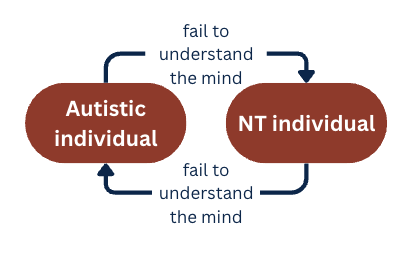Research
Theory of Mind, Autism, and Pragmatics
A lot of times, autism is considered a communicative disorder. A lot of times, this is described as autistic people struggling with pragmatics. A lot of times, this is said to be due to a lack of theory of mind. Yet these are strong assumptions that may or may not be true. What defines theory of mind or pragmatic performance? Which autistic groups — or subgroups — are we talking about? How much theory of mind does pragmatics actually involve? Do autistic people really struggle with pragmatics? Do they really struggle with theory of mind? In my research, I hope to revisit some of these existing assumptions about pragmatics in autism.
 how I like to think about the case of pragmatics (and communication in general) in autistic people; for a more detailed proposal, check here
how I like to think about the case of pragmatics (and communication in general) in autistic people; for a more detailed proposal, check here
Bilingualism (and dealing with bilingual data!)
As a bilingual speaker, I’m interested in how bilinguals navigate language choice in context — particularly the cognitive and contextual factors that trigger code-switching. While working with bilingual corpora, I also noticed how many NLP tools have limitations when applied to bilingual or code-switched data. This inspired me to start exploring how current machine learning tools can be adapted or improved to better handle the complexities of bilingual language use.
Thought, Consciousness, and how that languages
It always amazes me how every single person thinks and feels differently — from sensory processing to phenomenological processes, there is a wide range of introspective experiences that differs in people yet hard to talk about. How do “mental imageries” and “inner speech” connect to each other? How to measure them? And more importantly, how do these connect to language planning/production? I think it would be fascinating to look at how individuals experience thinking differently, and how this kind of “thought” influences language.